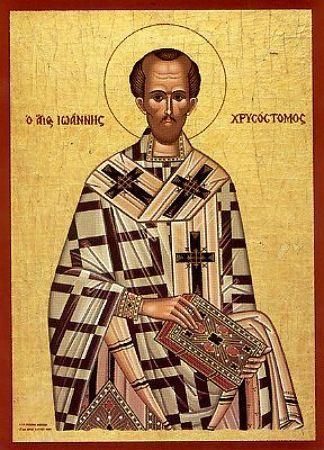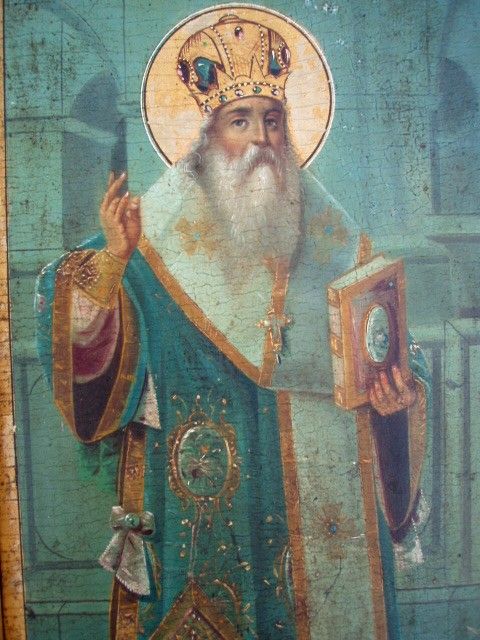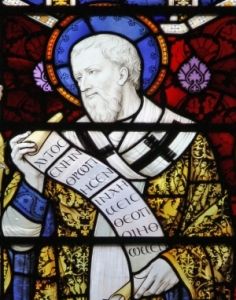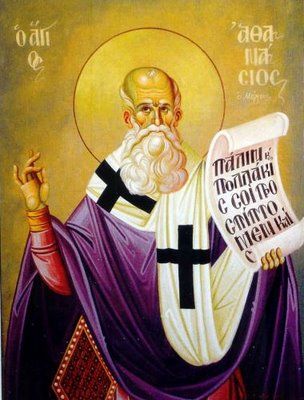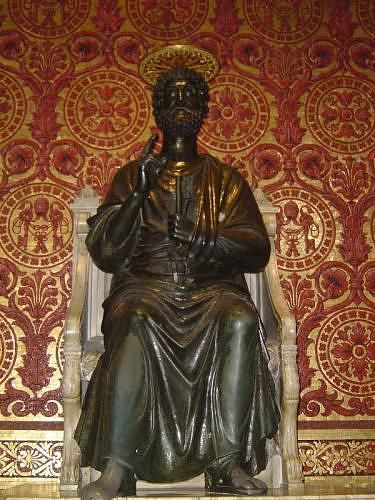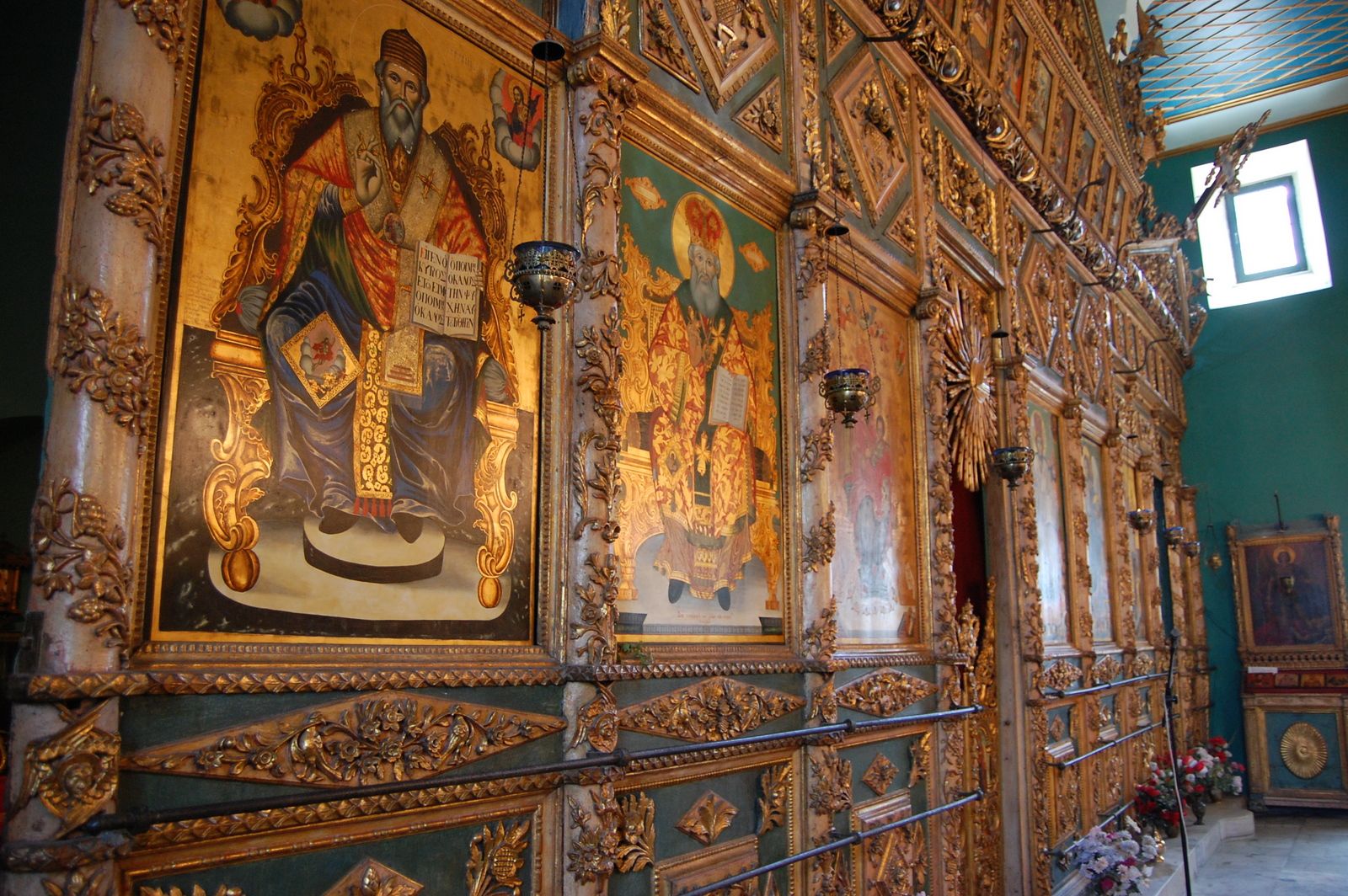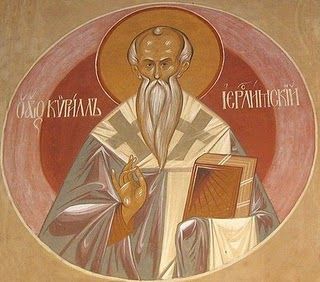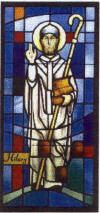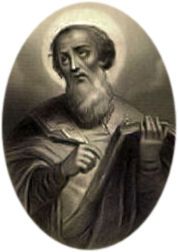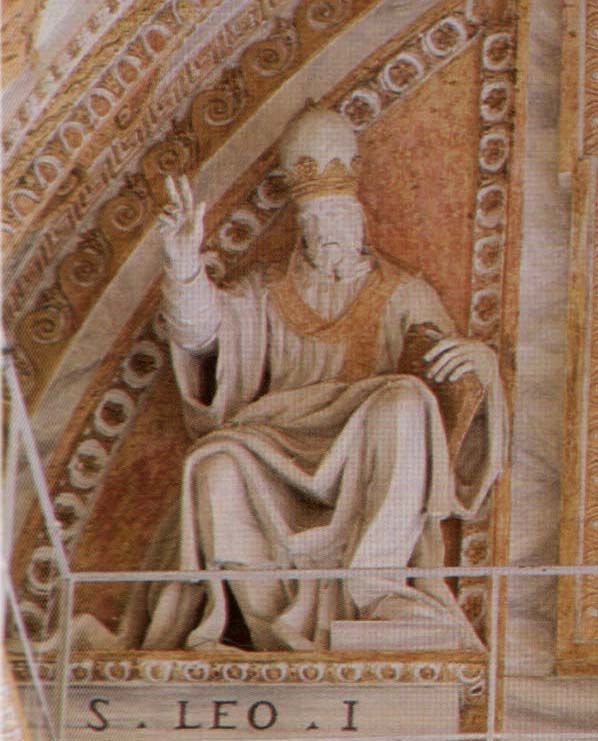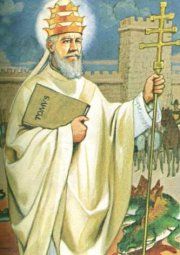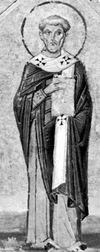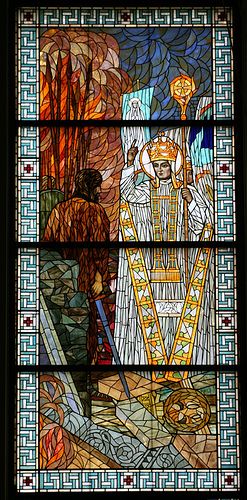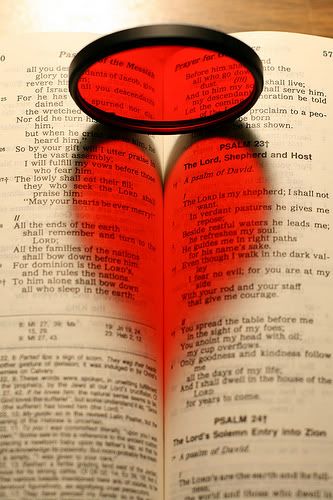Today, July 30, we celebrate the feast day of Saint Peter Chrysologus (380-450), bishop and Doctor of the Church. Saint Peter’s great gift to the Church is the words he left behind and the impact those words have upon those who hear them—both while he was alive, and in the present day. His name, meaning “Golden Word” in Greek, comes not from long and intricate homilies given on complex theological issues, but rather his humility and the hope that he would not “bore” the faithful. His teachings on the Annunciation, Prayer, Fasting and Mercy, the Incarnation and Human Dignity, the Priesthood of All Catholic Believers, the Epiphany, and the Love of God—as well as nearly 200 other sermons—survive today, inspiring us, and reminding us of the core tenets of our faith. He is credited as the first to deliver the “short sermon”—morally rich, Gospel-driven, doctrinally sound brief reflections on the Catholic way of being in the world, in relation to God.
Born in Imola, Italy, Peter was baptized, educated, and ordained a deacon by the Bishop of Imola, Cornelius. From his ordination, he was recognized for his simple, plain, and humble oratorical style—delivering sermons that reached all who listened. His eloquence earned him the name “Chrysologus,” meaning “golden-worded” in Greek.
Consecrated as Bishop of Ravenna—the capital of the Roman Empire in the West , Saint Peter spent the majority of his life there, tending to his flock, delivering sermons, countering heresy, encouraging service and mercy to others, and establishing services to care for the city’s poor. He is credited with driving paganism from the city, having remarked, "Anyone who wishes to frolic with the devil cannot rejoice with Christ."
Knowing that his own death was near, Peter returned to the city of his birth, Imola, and after urging great care in the choice of his successor he died there. His relics were buried in the church of Saint Cassian.
The legacy of Saint Peter Chrysologus is his writings. Below are excerpts from some of his sermons. His words, written in the fifth century, continue to have potent meaning today, calling us to lives of prayer, fasting, and mercy, and lives which value our personal human dignity as sons and daughters of Christ.
From a sermon by St. Peter Chrysologus on Prayer, Fasting, and Mercy:
There are three things, my brethren, by which faith stands firm, devotion remains constant, and virtue endures. They are prayer, fasting and mercy. Prayer knocks at the door, fasting obtains, mercy receives. Prayer, mercy and fasting: these three are one, and they give life to each other.
Fasting is the soul of prayer, mercy is the lifeblood of fasting. Let no one try to separate them; they cannot be separated. If you have only one of them or not all together, you have nothing. So if you pray, fast; if you fast, show mercy; if you want your petition to be heard, hear the petition of others. If you do not close your ear to others you open God’s ear to yourself.
When you fast, see the fasting of others. If you want God to know that you are hungry, know that another is hungry. If you hope for mercy, show mercy. If you look for kindness, show kindness. If you want to receive, give. If you ask for yourself what you deny to others, your asking is a mockery.
Let this be the pattern for all men when they practice mercy: show mercy to others in the same way, with the same generosity, with the same promptness, as you want others to show mercy to you.
Therefore, let prayer, mercy and fasting be one single plea to God on our behalf, one speech in our defense, a threefold united prayer in our favor.
Let us use fasting to make up for what we have lost by despising others. Let us offer our souls in sacrifice by means of fasting. There is nothing more pleasing that we can offer to God, as the psalmist said in prophecy: A sacrifice to God is a broken spirit; God does not despise a bruised and humbled heart.
Offer your soul to God, make him an oblation of your fasting, so that your soul may be a pure offering, a holy sacrifice, a living victim, remaining your own and at the same time made over to God. Whoever fails to give this to God will not be excused, for if you are to give him yourself you are never without the means of giving.
To make these acceptable, mercy must be added. Fasting bears no fruit unless it is watered by mercy. Fasting dries up when mercy dries up. Mercy is to fasting as rain is to earth. However much you may cultivate your heart, clear the soil of your nature, root out vices, sow virtues, if you do not release the springs of mercy, your fasting will bear no fruit.
When you fast, if your mercy is thin your harvest will be thin; when you fast, what you pour out in mercy overflows into your barn. Therefore, do not lose by saving, but gather in by scattering. Give to the poor, and you give to yourself. You will not be allowed to keep what you have refused to give to others.
From a sermon by Saint Peter Chrysologus on the Incarnation and Human Dignity
A virgin conceived, bore a son, and yet remained a virgin. This is no common occurrence, but a sign; no reason here, but God’s power, for he is the cause, and not nature. It is a special event, not shared by others; it is divine, not human. Christ’s birth was not necessity, but an expression of omnipotence, a sacrament of piety for the redemption of men. He who made man without generation from pure clay made man again and was born from a pure body. The hand that assumed clay to make our flesh deigned to assume a body for our salvation. That the Creator is in his creature and God is in the flesh brings dignity to man without dishonor to him who made him.
Why then, man, are you so worthless in your own eyes and yet so precious to God? Why render yourself such dishonor when you are honored by him? Why do you ask how you were created and do not seek to know why you were made? Was not this entire visible universe made for your dwelling? It was for you that the light dispelled the overshadowing gloom; for your sake was the night regulated and the day measured, and for you were the heavens embellished with the varying brilliance of the sun, the moon and the stars. The earth was adorned with flowers, groves and fruit; and the constant marvelous variety of lovely living things was created in the air, the fields, and the seas for you, lest sad solitude destroy the joy of God’s new creation. And the Creator still works to devise things that can add to your glory. He has made you in his image that you might in your person make the invisible Creator present on earth; he has made you his legate, so that the vast empire of the world might have the Lord’s representative. Then in his mercy God assumed what he made in you; he wanted now to be truly manifest in man, just as he had wished to be revealed in man as in an image. Now he would be in reality what he had submitted to be in symbol.
And so Christ is born that by his birth he might restore our nature. He became a child, was fed, and grew that he might inaugurate the one perfect age to remain for ever as he had created it. He supports man that man might no longer fall. And the creature he had formed of earth he now makes heavenly; and what he had endowed with a human soul he now vivifies to become a heavenly spirit. In this way he fully raised man to God, and left in him neither sin, nor death, nor travail, nor pain, nor anything earthly, with the grace of our Lord Christ Jesus, who lives and reigns with the Father in the unity of the Holy Spirit, now and forever, for all the ages of eternity. Amen.
Father,
You made Peter Chrysologus
an outstanding preacher of your incarnate Word.
May the prayers of St. Peter help us to cherish
the mystery of our salvation
and make its meaning clear in our love for others.
Grant this through our Lord Jesus Christ, Your Son,
who lives and reigns with you and the Holy Spirit,
one God, for ever and ever. Amen.
Why pray the Rosary every day for a year?
Each time the Blessed Virgin has appeared-- whether it be to Saint Bernadette Soubirous at Lourdes; to Lucia, Jacinta, and Francisco at Fatima; or to Mariette Beco at Banneux-- she has asserted the importance, saving grace, and power of praying the Holy Rosary on a daily basis. Based upon her words, the Rosary is penance and conversion for sinners, a pathway to peace, an end to war, and a powerful act of faith in Jesus Christ. Pope Paul VI presented the Rosary as a powerful means to reach Christ "not merely with Mary but indeed, insofar as this is possible to us, in the same way as Mary, who is certainly the one who thought about Him more than anyone else has ever done."
To show us how this is done, perhaps no one has been more eloquent than the great Cardinal Newman, who wrote: "The great power of the Rosary consists in the fact that it translates the Creed into Prayer. Of course, the Creed is already in a certain sense a prayer and a great act of homage towards God, but the Rosary brings us to meditate again on the great truth of His life and death, and brings this truth close to our hearts. Even Christians, although they know God, usually fear rather than love Him. The strength of the Rosary lies in the particular manner in which it considers these mysteries, since all our thinking about Christ is intertwined with the thought of His Mother, in the relations between Mother and Son; the Holy Family is presented to us, the home in which God lived His infinite love."
As Mary said at Fatima, "Jesus wants to use you to make Me known and loved. He wishes to establish the devotion to My Immaculate Heart throughout the world. I promise salvation to whoever embraces it; these souls will be dear to God, like flowers put by Me to adorn his throne."

Today, May 2, we celebrate the feast of Saint Athanasius (296-373), bishop, and Doctor of the Church. Athanasius has been called "the Father of Orthodoxy," "the Pillar of the Church," and "Champion of Christ's Divinity." Cardinal Newman described Athanasius as "a principal instrument after the apostles by which the sacred truths of the Church have been conveyed and secured to the world." He is venerated as on the four great Greek Doctors of the Church, and in the East, is considered one of the three Holy Hierarchs. Saint Athanasius is primarily responsible for defense of the true faith against the Arian heresy.
Below, an except from his seminal work On the Incarnation, “God Became Man to Redeem Us.”
The Word of God, incorporeal, incorruptible and immaterial, entered our world. Yet it was not as if he had been remote from it up to that time. For there is no part of the world that was ever without his presence; together with his Father, he continually filled all things and places.
Out of his loving-kindness for us he came to us, and we see this in the way he revealed himself openly to us. Taking pity on mankind’s weakness, and moved by our corruption, he could not stand aside and see death have the mastery over us; he did not want creation to perish and his Father’s work in fashioning man to be in vain. He therefore took to himself a body, no different from our own, for he did not wish simply to be in a body or only to be seen.
If he had wanted simply to be seen, he could indeed have taken another, and nobler, body. Instead, he took our body in its reality.
Within the Virgin he built himself a temple, that is, a body; he made it his own instrument in which to dwell and to reveal himself. In this way he received from mankind a body like our own, and, since all were subject to the corruption of death, he delivered this body over to death for all, and with supreme love offered it to the Father. He did so to destroy the law of corruption passed against all men, since all died in him. The law, which had spent its force on the body of the Lord, could no longer have any power over his fellowmen. Moreover, this was the way in which the Word was to restore mankind to immortality, after it had fallen into corruption, and summon it back from death to life. He utterly destroyed the power death had against mankind - as fire consumes chaff - by means of the body he had taken and the grace of the resurrection.
This is the reason why the Word assumed a body that could die, so that this body, sharing in the Word who is above all, might satisfy death’s requirement in place of all. Because of the Word dwelling in that body, it would remain incorruptible, and all would be freed for ever from corruption by the grace of the resurrection.
In death the Word made a spotless sacrifice and oblation of the body he had taken. by dying for others, he immediately banished death for all mankind.
In this way the Word of God, who is above all, dedicated and offered his temple, the instrument that was his body, for us all, as he said, and so paid by his own death the debt that was owed. The immortal Son of God, united with all men by likeness of nature, thus fulfilled all justice in restoring mankind to immortality by the promise of the resurrection.
The corruption of death no longer holds any power over mankind, thanks to the Word, who has come to dwell among them through his one body.
Below, an except from his seminal work On the Incarnation, “God Became Man to Redeem Us.”
The Word of God, incorporeal, incorruptible and immaterial, entered our world. Yet it was not as if he had been remote from it up to that time. For there is no part of the world that was ever without his presence; together with his Father, he continually filled all things and places.
Out of his loving-kindness for us he came to us, and we see this in the way he revealed himself openly to us. Taking pity on mankind’s weakness, and moved by our corruption, he could not stand aside and see death have the mastery over us; he did not want creation to perish and his Father’s work in fashioning man to be in vain. He therefore took to himself a body, no different from our own, for he did not wish simply to be in a body or only to be seen.
If he had wanted simply to be seen, he could indeed have taken another, and nobler, body. Instead, he took our body in its reality.
Within the Virgin he built himself a temple, that is, a body; he made it his own instrument in which to dwell and to reveal himself. In this way he received from mankind a body like our own, and, since all were subject to the corruption of death, he delivered this body over to death for all, and with supreme love offered it to the Father. He did so to destroy the law of corruption passed against all men, since all died in him. The law, which had spent its force on the body of the Lord, could no longer have any power over his fellowmen. Moreover, this was the way in which the Word was to restore mankind to immortality, after it had fallen into corruption, and summon it back from death to life. He utterly destroyed the power death had against mankind - as fire consumes chaff - by means of the body he had taken and the grace of the resurrection.
This is the reason why the Word assumed a body that could die, so that this body, sharing in the Word who is above all, might satisfy death’s requirement in place of all. Because of the Word dwelling in that body, it would remain incorruptible, and all would be freed for ever from corruption by the grace of the resurrection.
In death the Word made a spotless sacrifice and oblation of the body he had taken. by dying for others, he immediately banished death for all mankind.
In this way the Word of God, who is above all, dedicated and offered his temple, the instrument that was his body, for us all, as he said, and so paid by his own death the debt that was owed. The immortal Son of God, united with all men by likeness of nature, thus fulfilled all justice in restoring mankind to immortality by the promise of the resurrection.
The corruption of death no longer holds any power over mankind, thanks to the Word, who has come to dwell among them through his one body.
Today, January 13, marks the memorial of Saint Hilary of Poiters (A.D. 368), Church bishop and Doctor. Known as a staunch defender of the faith, Saint Hilary suffered persecution and exile for asserting the truth of the divinity of Jesus. Saint Hilary orthodoxy and public defense of the faith led to exile on the coast of then, Phyrgia (now Turkey). While in exile he penned a 12 volume set of books devoted to exploration of the divinity of Christ and the Holy Trinity.
Below, an excerpt from Saint Hilary’s text on the Holy Trinity, focusing on the presence of the true flesh and blood of Christ during the Celebration of Mass, as an extension of the Incarnation.
We believe that the Word became flesh and that we receive his flesh in the Lord’s Supper. How then can we fail to believe that he really dwells within us? When he became man, he actually clothed himself in our flesh, uniting it to himself for ever. In the sacrament of his body he actually gives us his own flesh, which he has united to his divinity. This is why we are all one, because the Father is in Christ, and Christ is in us. He is in us through his flesh and we are in him. With him we form a unity which is in God.
The manner of our indwelling in him through the sacrament of his body and blood is evident from the Lord’s own words: This world will see me no longer but you shall see me. Because I live you shall live also, for I am in my Father, you are in me, and I am in you. If it had been a question of a mere unity of will, why should he have given us this explanation of the steps by which it is achieved? He is in the Father by reason of his divine nature, we are in h im by reason of his human birth, and he is in us through the mystery of the sacraments. This, surely, is what he wished us to believe; this is how he wanted us to understand the perfect unity that is achieved through our Mediator, who lives in the Father while we live in him, and who, while living in the Father, lives also in us. This is how we attain to unity with the Father. Christ is in very truth in the Father by his eternal generation; we are in very truth in Christ, and he likewise is in us.
Christ himself bore witness to the reality of this unity when he said: He who eats my flesh and drinks my blood lives in me and I in him. No one will be in Christ unless Christ himself has been in him; Christ will take to himself only the flesh of those who have received his flesh. He had already explained the mystery of this perfect unity when he said: As the living Father sent me and I draw life from the Father, so he who eats my flesh will draw life from me. We draw life from his flesh just as he draws life from the Father. Such comparisons aid our understanding, since we can grasp a point more easily when we have an analogy. And the point is that Christ is the wellspring of our life. Since we who are in the flesh have Christ dwelling in us through his flesh, we shall draw life from him in te same way as he draws life from the Father.
Below, an excerpt from Saint Hilary’s text on the Holy Trinity, focusing on the presence of the true flesh and blood of Christ during the Celebration of Mass, as an extension of the Incarnation.
We believe that the Word became flesh and that we receive his flesh in the Lord’s Supper. How then can we fail to believe that he really dwells within us? When he became man, he actually clothed himself in our flesh, uniting it to himself for ever. In the sacrament of his body he actually gives us his own flesh, which he has united to his divinity. This is why we are all one, because the Father is in Christ, and Christ is in us. He is in us through his flesh and we are in him. With him we form a unity which is in God.
The manner of our indwelling in him through the sacrament of his body and blood is evident from the Lord’s own words: This world will see me no longer but you shall see me. Because I live you shall live also, for I am in my Father, you are in me, and I am in you. If it had been a question of a mere unity of will, why should he have given us this explanation of the steps by which it is achieved? He is in the Father by reason of his divine nature, we are in h im by reason of his human birth, and he is in us through the mystery of the sacraments. This, surely, is what he wished us to believe; this is how he wanted us to understand the perfect unity that is achieved through our Mediator, who lives in the Father while we live in him, and who, while living in the Father, lives also in us. This is how we attain to unity with the Father. Christ is in very truth in the Father by his eternal generation; we are in very truth in Christ, and he likewise is in us.
Christ himself bore witness to the reality of this unity when he said: He who eats my flesh and drinks my blood lives in me and I in him. No one will be in Christ unless Christ himself has been in him; Christ will take to himself only the flesh of those who have received his flesh. He had already explained the mystery of this perfect unity when he said: As the living Father sent me and I draw life from the Father, so he who eats my flesh will draw life from me. We draw life from his flesh just as he draws life from the Father. Such comparisons aid our understanding, since we can grasp a point more easily when we have an analogy. And the point is that Christ is the wellspring of our life. Since we who are in the flesh have Christ dwelling in us through his flesh, we shall draw life from him in te same way as he draws life from the Father.
Today, November 10, we also celebrate the feast day of Pope Saint Leo the Great (400-461). Pope Saint Leo is referred to by many names, including “Doctor of Doctrine” and “Doctor of Unity of the Church.” He is the first pope to be referred to by the title “Great,” and the first born pope made Doctor of the Church. His writings, unifying doctrine, and peacemaking continue to inspire and instruct us today in the ways of the faith. Below, an excerpt from a homily, encouraging Christians to take heed of the joy of Christ, and exhorts them to live in freedom and dignity of the Incarnation!
Christian, Remember Your Dignity!
Dearly beloved, today our Savior is born; let us rejoice. Sadness should have no place on the birthday of life. The fear of death has been swallowed up; life brings us joy with the promise of eternal happiness.
No one is shut out from this joy; all share the same reason for rejoicing. Our Lord, victor over sin and death, finding no man free from sin, came to free us all. Let the saint rejoice as he sees the palm of victory at hand. Let the sinner be glad as he receives the offer of forgiveness. Let the pagan take courage as he is summoned to life.
In the fullness of time, chosen in the unfathomable depths of God’s wisdom, the Son of God took for himself our common humanity in order to reconcile it with its creator. He came to overthrow the devil, the origin of death, in that very nature by which he had overthrown mankind.
And so at the birth of our Lord the angels sing in joy: Glory to God in the highest, and they proclaim peace to men of good will as they see the heavenly Jerusalem being built from all the nations of the world. When the angels on high are so exultant at this marvellous work of God’s goodness, what joy should it not bring to the lowly hearts of men?
Beloved, let us give thanks to God the Father, through his Son, in the Holy Spirit, because in his great love for us he took pity on us, and when we were dead in our sins he brought us to life with Christ, so that in him we might be a new creation. Let us throw off our old nature and all its ways and, as we have come to birth in Christ, let us renounce the works of the flesh.
Christian, remember your dignity, and now that you share in God’s own nature, do not return by sin to your former base condition. Bear in mind who is your head and of whose body you are a member. Do not forget that you have been rescued from the power of darkness and brought into the light of God’s kingdom.
Through the sacrament of baptism you have become a temple of the Holy Spirit. Do not drive away so great a guest by evil conduct and become again a slave to the devil, for your liberty was bought by the blood of Christ.
Christian, Remember Your Dignity!
Dearly beloved, today our Savior is born; let us rejoice. Sadness should have no place on the birthday of life. The fear of death has been swallowed up; life brings us joy with the promise of eternal happiness.
No one is shut out from this joy; all share the same reason for rejoicing. Our Lord, victor over sin and death, finding no man free from sin, came to free us all. Let the saint rejoice as he sees the palm of victory at hand. Let the sinner be glad as he receives the offer of forgiveness. Let the pagan take courage as he is summoned to life.
In the fullness of time, chosen in the unfathomable depths of God’s wisdom, the Son of God took for himself our common humanity in order to reconcile it with its creator. He came to overthrow the devil, the origin of death, in that very nature by which he had overthrown mankind.
And so at the birth of our Lord the angels sing in joy: Glory to God in the highest, and they proclaim peace to men of good will as they see the heavenly Jerusalem being built from all the nations of the world. When the angels on high are so exultant at this marvellous work of God’s goodness, what joy should it not bring to the lowly hearts of men?
Beloved, let us give thanks to God the Father, through his Son, in the Holy Spirit, because in his great love for us he took pity on us, and when we were dead in our sins he brought us to life with Christ, so that in him we might be a new creation. Let us throw off our old nature and all its ways and, as we have come to birth in Christ, let us renounce the works of the flesh.
Christian, remember your dignity, and now that you share in God’s own nature, do not return by sin to your former base condition. Bear in mind who is your head and of whose body you are a member. Do not forget that you have been rescued from the power of darkness and brought into the light of God’s kingdom.
Through the sacrament of baptism you have become a temple of the Holy Spirit. Do not drive away so great a guest by evil conduct and become again a slave to the devil, for your liberty was bought by the blood of Christ.
Today, November 10, we also celebrate the feast day of Pope Saint Leo the Great (400-461). Pope Saint Leo is referred to by many names, including “Doctor of Doctrine” and “Doctor of Unity of the Church.” He is the first pope to be referred to by the title “Great,” and the first born pope made Doctor of the Church. His writings, unifying doctrine, and peacemaking continue to inspire and instruct us today in the ways of the faith. Below, an excerpt from a homily regarding the “royalty” of Our Blessed Mother:
The Royal Virgin Mary, of the House of David
A royal virgin of the house of David is chosen. She is to bear holy child, one who is both God and man. She is to conceive him in her soul before she conceives him in her body. In the face of so unheard of an event she is to know no fear through ignorance of the divine plan; the angel tells her what is to be accomplished in her by the Holy Spirit. She believes that there will be no loss of virginity, she who is soon to be the mother of God. Why should she lose heart at this new form of conceiving when she has been promised that it will be effected through the power of the Most High? She believes, and her faith is confirmed by the witness of a previous wonder: against all expectation Elizabeth is made fruitful. God has enabled a barren woman to be with child; he must be believed when he makes the same promise to a virgin.
The Son of God who was in the beginning with God, through whom all things were made, without whom nothing was made (Jn 1), became man to free him from eternal death. He stooped down to take up our lowliness without loss to his own glory. He remained what he was; he took up what he was not. He wanted to join the very nature of a servant to that nature in which he is equal to God the Father. He wanted to unite both natures in an alliance so wonderful that the glory of the greater would not annihilate the lesser, nor the taking up of the lower diminish the greatness of the higher.
What belongs to each nature is preserved intact and meets the other in one person: lowliness is taken up by greatness, weakness by power, mortality by eternity. To pay the debt of our human condition, a nature incapable of suffering is united to a nature capable fo suffering, and true God and true man are forged into the unity that is the Lord. This was done to make possible the kind of remedy that fitted our human need: one and the same mediator between God and men able to die because of one nature, able to rise again because of the other. It was fitting, therefore, that the birth which brings salvation brought no corruption to virginal integrity; the bringing forth of Truth was at the same time the safeguarding of virginity.
Dearly beloved, this kind of birth was fitting for Christ, the power and the wisdom of God: a birth in which he was one with us in our human nature but far above us in his divinity. If he were not true God, he would not be able to bring us healing; if he were not true man, he would not be able to give us an example.
And so at the birth of our Lord, the angels sing in joy: Glory to God in the highest (Lk 2), and they proclaim peace to his people on earth as they see the heavenly Jerusalem being built from all the nations of the world. If the angels on high are so exultant at this marvelous work of God’s goodness, what joy should it not bring to the lowly hearts of men?
The Royal Virgin Mary, of the House of David
A royal virgin of the house of David is chosen. She is to bear holy child, one who is both God and man. She is to conceive him in her soul before she conceives him in her body. In the face of so unheard of an event she is to know no fear through ignorance of the divine plan; the angel tells her what is to be accomplished in her by the Holy Spirit. She believes that there will be no loss of virginity, she who is soon to be the mother of God. Why should she lose heart at this new form of conceiving when she has been promised that it will be effected through the power of the Most High? She believes, and her faith is confirmed by the witness of a previous wonder: against all expectation Elizabeth is made fruitful. God has enabled a barren woman to be with child; he must be believed when he makes the same promise to a virgin.
The Son of God who was in the beginning with God, through whom all things were made, without whom nothing was made (Jn 1), became man to free him from eternal death. He stooped down to take up our lowliness without loss to his own glory. He remained what he was; he took up what he was not. He wanted to join the very nature of a servant to that nature in which he is equal to God the Father. He wanted to unite both natures in an alliance so wonderful that the glory of the greater would not annihilate the lesser, nor the taking up of the lower diminish the greatness of the higher.
What belongs to each nature is preserved intact and meets the other in one person: lowliness is taken up by greatness, weakness by power, mortality by eternity. To pay the debt of our human condition, a nature incapable of suffering is united to a nature capable fo suffering, and true God and true man are forged into the unity that is the Lord. This was done to make possible the kind of remedy that fitted our human need: one and the same mediator between God and men able to die because of one nature, able to rise again because of the other. It was fitting, therefore, that the birth which brings salvation brought no corruption to virginal integrity; the bringing forth of Truth was at the same time the safeguarding of virginity.
Dearly beloved, this kind of birth was fitting for Christ, the power and the wisdom of God: a birth in which he was one with us in our human nature but far above us in his divinity. If he were not true God, he would not be able to bring us healing; if he were not true man, he would not be able to give us an example.
And so at the birth of our Lord, the angels sing in joy: Glory to God in the highest (Lk 2), and they proclaim peace to his people on earth as they see the heavenly Jerusalem being built from all the nations of the world. If the angels on high are so exultant at this marvelous work of God’s goodness, what joy should it not bring to the lowly hearts of men?
Today, November 10, we also celebrate the feast day of Pope Saint Leo the Great (400-461). Pope Saint Leo is referred to by many names, including “Doctor of Doctrine” and “Doctor of Unity of the Church.” He is the first pope to be referred to by the title “Great,” and the first born pope made Doctor of the Church. His writings, unifying doctrine, and peacemaking continue to inspire and instruct us today in the ways of the faith. Below, an excerpt from a homily of Pope Saint Leo, regarding the body of Christ in the Church, the Incarnation, and the continual in-dwelling of the Church in Christ.
Christ Lives in His Church
My dear brethren, there is no doubt that the Son of God took our human nature into so close a union with himself that one and the same Christ is present, not only in the firstborn of all creation, but in all his saints as well. The head cannot be separated from the members, nor the members from the head. Not in this life, it is true, but only in eternity will God be all in all, yet even now he dwells, whole and undivided, in his temple the Church. Such was his promise to us when he said: See, I am with you always, even to the end of the world.
And so all that the Son of God did and taught for the world’s reconciliation is not for us simply a matter of past history. Here and now we experience his power at work among us. Born of a virgin mother by the action of the Holy Spirit, Christ keeps his Church spotless and makes her fruitful by the inspiration of the same Spirit. In baptismal regeneration she brings forth children for God beyond all numbering. These are the sons of whom it is written: They are born not of blood, nor of the desire of the flesh, nor of the will of man, but of God.
In Christ Abraham’s posterity is blessed, because in him the whole world receives the adoption of sons, and in him the patriarch becomes the father of all nations through the birth, not from human stock but by faith, of the descendants that were promised to him. From every nation on earth, without exception, Christ forms a single flock of those he has sanctified, daily fulfilling the promise he once made: I have other sheep, not of this fold, whom it is also ordained that I shall lead; and there shall be one flock and one shepherd.
Although it was primarily to Peter that he said: Feed my sheep, yet the one Lord guides all the pastors in the discharge of their office and leads to rich and fertile pastures all those who come to the rock. There is no counting the sheep who are nourished with his abundant love, and who are prepared to lay down their lives for the sake of the good shepherd who died for them.
But it is not only the martyrs who share in his passion by their glorious courage; the same is true, by faith, of all who are reborn through baptism. That is why we are to celebrate the Lord’s paschal sacrifice with the unleavened bread of sincerity and truth. The leaven of our former malice is thrown out, and a new creature is filled and inebriated with the Lord himself. For the effect of our sharing in the body and blood of Christ is to change us into what we receive. As we have died with him, and have been buried and raised to life with him, so we bear him within us, both in body and in spirit, in everything we do.
Christ Lives in His Church
My dear brethren, there is no doubt that the Son of God took our human nature into so close a union with himself that one and the same Christ is present, not only in the firstborn of all creation, but in all his saints as well. The head cannot be separated from the members, nor the members from the head. Not in this life, it is true, but only in eternity will God be all in all, yet even now he dwells, whole and undivided, in his temple the Church. Such was his promise to us when he said: See, I am with you always, even to the end of the world.
And so all that the Son of God did and taught for the world’s reconciliation is not for us simply a matter of past history. Here and now we experience his power at work among us. Born of a virgin mother by the action of the Holy Spirit, Christ keeps his Church spotless and makes her fruitful by the inspiration of the same Spirit. In baptismal regeneration she brings forth children for God beyond all numbering. These are the sons of whom it is written: They are born not of blood, nor of the desire of the flesh, nor of the will of man, but of God.
In Christ Abraham’s posterity is blessed, because in him the whole world receives the adoption of sons, and in him the patriarch becomes the father of all nations through the birth, not from human stock but by faith, of the descendants that were promised to him. From every nation on earth, without exception, Christ forms a single flock of those he has sanctified, daily fulfilling the promise he once made: I have other sheep, not of this fold, whom it is also ordained that I shall lead; and there shall be one flock and one shepherd.
Although it was primarily to Peter that he said: Feed my sheep, yet the one Lord guides all the pastors in the discharge of their office and leads to rich and fertile pastures all those who come to the rock. There is no counting the sheep who are nourished with his abundant love, and who are prepared to lay down their lives for the sake of the good shepherd who died for them.
But it is not only the martyrs who share in his passion by their glorious courage; the same is true, by faith, of all who are reborn through baptism. That is why we are to celebrate the Lord’s paschal sacrifice with the unleavened bread of sincerity and truth. The leaven of our former malice is thrown out, and a new creature is filled and inebriated with the Lord himself. For the effect of our sharing in the body and blood of Christ is to change us into what we receive. As we have died with him, and have been buried and raised to life with him, so we bear him within us, both in body and in spirit, in everything we do.
Today, July 30, we celebrate the feast day of Saint Peter Chrysologus (380-450), bishop and Doctor of the Church. Saint Peter’s great gift to the Church is the words he left behind and the impact those words have upon those who hear them—both while he was alive, and in the present day. His name, meaning “Golden Word” in Greek, comes not from long and intricate homilies given on complex theological issues, but rather his humility and the hope that he would not “bore” the faithful. His teachings on the Annunciation, Prayer, Fasting and Mercy, the Incarnation and Human Dignity, the Priesthood of All Catholic Believers, the Epiphany, and the Love of God—as well as nearly 200 other sermons—survive today, inspiring us, and reminding us of the core tenets of our faith. He is credited as the first to deliver the “short sermon”—morally rich, Gospel-driven, doctrinally sound brief reflections on the Catholic way of being in the world, in relation to God.
Born in Imola, Italy, Peter was baptized, educated, and ordained a deacon by the Bishop of Imola, Cornelius. From his ordination, he was recognized for his simple, plain, and humble oratorical style—delivering sermons that reached all who listened. His eloquence earned him the name “Chrysologus,” meaning “golden-worded” in Greek.
Consecrated as Bishop of Ravenna—the capital of the Roman Empire in the West , Saint Peter spent the majority of his life there, tending to his flock, delivering sermons, countering heresy, encouraging service and mercy to others, and establishing services to care for the city’s poor. He is credited with driving paganism from the city, having remarked, "Anyone who wishes to frolic with the devil cannot rejoice with Christ."
Knowing that his own death was near, Peter returned to the city of his birth, Imola, and after urging great care in the choice of his successor he died there. His relics were buried in the church of Saint Cassian.
The legacy of Saint Peter Chrysologus is his writings. Below are excerpts from some of his sermons. His words, written in the fifth century, continue to have potent meaning today, calling us to lives of prayer, fasting, and mercy, and lives which value our personal human dignity as sons and daughters of Christ.
From a sermon by St. Peter Chrysologus on Prayer, Fasting, and Mercy:
There are three things, my brethren, by which faith stands firm, devotion remains constant, and virtue endures. They are prayer, fasting and mercy. Prayer knocks at the door, fasting obtains, mercy receives. Prayer, mercy and fasting: these three are one, and they give life to each other.
Fasting is the soul of prayer, mercy is the lifeblood of fasting. Let no one try to separate them; they cannot be separated. If you have only one of them or not all together, you have nothing. So if you pray, fast; if you fast, show mercy; if you want your petition to be heard, hear the petition of others. If you do not close your ear to others you open God’s ear to yourself.
When you fast, see the fasting of others. If you want God to know that you are hungry, know that another is hungry. If you hope for mercy, show mercy. If you look for kindness, show kindness. If you want to receive, give. If you ask for yourself what you deny to others, your asking is a mockery.
Let this be the pattern for all men when they practice mercy: show mercy to others in the same way, with the same generosity, with the same promptness, as you want others to show mercy to you.
Therefore, let prayer, mercy and fasting be one single plea to God on our behalf, one speech in our defense, a threefold united prayer in our favor.
Let us use fasting to make up for what we have lost by despising others. Let us offer our souls in sacrifice by means of fasting. There is nothing more pleasing that we can offer to God, as the psalmist said in prophecy: A sacrifice to God is a broken spirit; God does not despise a bruised and humbled heart.
Offer your soul to God, make him an oblation of your fasting, so that your soul may be a pure offering, a holy sacrifice, a living victim, remaining your own and at the same time made over to God. Whoever fails to give this to God will not be excused, for if you are to give him yourself you are never without the means of giving.
To make these acceptable, mercy must be added. Fasting bears no fruit unless it is watered by mercy. Fasting dries up when mercy dries up. Mercy is to fasting as rain is to earth. However much you may cultivate your heart, clear the soil of your nature, root out vices, sow virtues, if you do not release the springs of mercy, your fasting will bear no fruit.
When you fast, if your mercy is thin your harvest will be thin; when you fast, what you pour out in mercy overflows into your barn. Therefore, do not lose by saving, but gather in by scattering. Give to the poor, and you give to yourself. You will not be allowed to keep what you have refused to give to others.
From a sermon by Saint Peter Chrysologus on the Incarnation and Human Dignity
A virgin conceived, bore a son, and yet remained a virgin. This is no common occurrence, but a sign; no reason here, but God’s power, for he is the cause, and not nature. It is a special event, not shared by others; it is divine, not human. Christ’s birth was not necessity, but an expression of omnipotence, a sacrament of piety for the redemption of men. He who made man without generation from pure clay made man again and was born from a pure body. The hand that assumed clay to make our flesh deigned to assume a body for our salvation. That the Creator is in his creature and God is in the flesh brings dignity to man without dishonor to him who made him.
Why then, man, are you so worthless in your own eyes and yet so precious to God? Why render yourself such dishonor when you are honored by him? Why do you ask how you were created and do not seek to know why you were made? Was not this entire visible universe made for your dwelling? It was for you that the light dispelled the overshadowing gloom; for your sake was the night regulated and the day measured, and for you were the heavens embellished with the varying brilliance of the sun, the moon and the stars. The earth was adorned with flowers, groves and fruit; and the constant marvelous variety of lovely living things was created in the air, the fields, and the seas for you, lest sad solitude destroy the joy of God’s new creation. And the Creator still works to devise things that can add to your glory. He has made you in his image that you might in your person make the invisible Creator present on earth; he has made you his legate, so that the vast empire of the world might have the Lord’s representative. Then in his mercy God assumed what he made in you; he wanted now to be truly manifest in man, just as he had wished to be revealed in man as in an image. Now he would be in reality what he had submitted to be in symbol.
And so Christ is born that by his birth he might restore our nature. He became a child, was fed, and grew that he might inaugurate the one perfect age to remain for ever as he had created it. He supports man that man might no longer fall. And the creature he had formed of earth he now makes heavenly; and what he had endowed with a human soul he now vivifies to become a heavenly spirit. In this way he fully raised man to God, and left in him neither sin, nor death, nor travail, nor pain, nor anything earthly, with the grace of our Lord Christ Jesus, who lives and reigns with the Father in the unity of the Holy Spirit, now and forever, for all the ages of eternity. Amen.
Father,
You made Peter Chrysologus
an outstanding preacher of your incarnate Word.
May the prayers of St. Peter help us to cherish
the mystery of our salvation
and make its meaning clear in our love for others.
Grant this through our Lord Jesus Christ, Your Son,
who lives and reigns with you and the Holy Spirit,
one God, for ever and ever. Amen.
Inspired by the origins and spiritual history of the Holy Rosary, we continue our meditation on the psalms, one each day, in order, for 150 days.
Today’s Psalm: Psalm 96: The Glories of the Lord, the King of the Universe
1 Sing to the LORD a new song;
sing to the LORD, all the earth.
2 Sing to the LORD, praise his name;
proclaim his salvation day after day.
3 Declare his glory among the nations,
his marvelous deeds among all peoples.
4 For great is the LORD and most worthy of praise;
he is to be feared above all gods.
5 For all the gods of the nations are idols,
but the LORD made the heavens.
6 Splendor and majesty are before him;
strength and glory are in his sanctuary.
7 Ascribe to the LORD, O families of nations,
ascribe to the LORD glory and strength.
8 Ascribe to the LORD the glory due his name;
bring an offering and come into his courts.
9 Worship the LORD in the splendor of his holiness;
tremble before him, all the earth.
10 Say among the nations, "The LORD reigns."
The world is firmly established, it cannot be moved;
he will judge the peoples with equity.
11 Let the heavens rejoice, let the earth be glad;
let the sea resound, and all that is in it;
12 let the fields be jubilant, and everything in them.
Then all the trees of the forest will sing for joy;
13 they will sing before the LORD, for he comes,
he comes to judge the earth.
He will judge the world in righteousness
and the peoples in his truth.
Day 211 of 365
Prayer Intentions: Respect for Human Dignity; Lives true to the teachings of the Church.
Requested Intentions: End to debt and legal difficulties; immigration success (B); For a mother’s continued employment (S); For continued blessings on a relationship (S); For a sick grandmother (R); For the building of a Catholic community, family, and law practice (M); For healing of friends and family (B); For healing of an aunt with kidney disease (S); For the total deliverance of P (S); To know and follow the Will of God (M); Employment for husband and wife (K); Wisdom; Closer walk with Jesus (R); For successful conception (I); Thanksgiving for blessings received (K); Healing and financial assistance (F); Employment; Discernment of God’s will (A); For a recovery and sanctification (X); Those suffering from depression (J); Successful adoption (S); Healing of a father battling cancer (S).
Psalm: Psalm 96: The Glories of the Lord, the King of the Universe
Born in Imola, Italy, Peter was baptized, educated, and ordained a deacon by the Bishop of Imola, Cornelius. From his ordination, he was recognized for his simple, plain, and humble oratorical style—delivering sermons that reached all who listened. His eloquence earned him the name “Chrysologus,” meaning “golden-worded” in Greek.
Consecrated as Bishop of Ravenna—the capital of the Roman Empire in the West , Saint Peter spent the majority of his life there, tending to his flock, delivering sermons, countering heresy, encouraging service and mercy to others, and establishing services to care for the city’s poor. He is credited with driving paganism from the city, having remarked, "Anyone who wishes to frolic with the devil cannot rejoice with Christ."
Knowing that his own death was near, Peter returned to the city of his birth, Imola, and after urging great care in the choice of his successor he died there. His relics were buried in the church of Saint Cassian.
The legacy of Saint Peter Chrysologus is his writings. Below are excerpts from some of his sermons. His words, written in the fifth century, continue to have potent meaning today, calling us to lives of prayer, fasting, and mercy, and lives which value our personal human dignity as sons and daughters of Christ.
From a sermon by St. Peter Chrysologus on Prayer, Fasting, and Mercy:
There are three things, my brethren, by which faith stands firm, devotion remains constant, and virtue endures. They are prayer, fasting and mercy. Prayer knocks at the door, fasting obtains, mercy receives. Prayer, mercy and fasting: these three are one, and they give life to each other.
Fasting is the soul of prayer, mercy is the lifeblood of fasting. Let no one try to separate them; they cannot be separated. If you have only one of them or not all together, you have nothing. So if you pray, fast; if you fast, show mercy; if you want your petition to be heard, hear the petition of others. If you do not close your ear to others you open God’s ear to yourself.
When you fast, see the fasting of others. If you want God to know that you are hungry, know that another is hungry. If you hope for mercy, show mercy. If you look for kindness, show kindness. If you want to receive, give. If you ask for yourself what you deny to others, your asking is a mockery.
Let this be the pattern for all men when they practice mercy: show mercy to others in the same way, with the same generosity, with the same promptness, as you want others to show mercy to you.
Therefore, let prayer, mercy and fasting be one single plea to God on our behalf, one speech in our defense, a threefold united prayer in our favor.
Let us use fasting to make up for what we have lost by despising others. Let us offer our souls in sacrifice by means of fasting. There is nothing more pleasing that we can offer to God, as the psalmist said in prophecy: A sacrifice to God is a broken spirit; God does not despise a bruised and humbled heart.
Offer your soul to God, make him an oblation of your fasting, so that your soul may be a pure offering, a holy sacrifice, a living victim, remaining your own and at the same time made over to God. Whoever fails to give this to God will not be excused, for if you are to give him yourself you are never without the means of giving.
To make these acceptable, mercy must be added. Fasting bears no fruit unless it is watered by mercy. Fasting dries up when mercy dries up. Mercy is to fasting as rain is to earth. However much you may cultivate your heart, clear the soil of your nature, root out vices, sow virtues, if you do not release the springs of mercy, your fasting will bear no fruit.
When you fast, if your mercy is thin your harvest will be thin; when you fast, what you pour out in mercy overflows into your barn. Therefore, do not lose by saving, but gather in by scattering. Give to the poor, and you give to yourself. You will not be allowed to keep what you have refused to give to others.
From a sermon by Saint Peter Chrysologus on the Incarnation and Human Dignity
A virgin conceived, bore a son, and yet remained a virgin. This is no common occurrence, but a sign; no reason here, but God’s power, for he is the cause, and not nature. It is a special event, not shared by others; it is divine, not human. Christ’s birth was not necessity, but an expression of omnipotence, a sacrament of piety for the redemption of men. He who made man without generation from pure clay made man again and was born from a pure body. The hand that assumed clay to make our flesh deigned to assume a body for our salvation. That the Creator is in his creature and God is in the flesh brings dignity to man without dishonor to him who made him.
Why then, man, are you so worthless in your own eyes and yet so precious to God? Why render yourself such dishonor when you are honored by him? Why do you ask how you were created and do not seek to know why you were made? Was not this entire visible universe made for your dwelling? It was for you that the light dispelled the overshadowing gloom; for your sake was the night regulated and the day measured, and for you were the heavens embellished with the varying brilliance of the sun, the moon and the stars. The earth was adorned with flowers, groves and fruit; and the constant marvelous variety of lovely living things was created in the air, the fields, and the seas for you, lest sad solitude destroy the joy of God’s new creation. And the Creator still works to devise things that can add to your glory. He has made you in his image that you might in your person make the invisible Creator present on earth; he has made you his legate, so that the vast empire of the world might have the Lord’s representative. Then in his mercy God assumed what he made in you; he wanted now to be truly manifest in man, just as he had wished to be revealed in man as in an image. Now he would be in reality what he had submitted to be in symbol.
And so Christ is born that by his birth he might restore our nature. He became a child, was fed, and grew that he might inaugurate the one perfect age to remain for ever as he had created it. He supports man that man might no longer fall. And the creature he had formed of earth he now makes heavenly; and what he had endowed with a human soul he now vivifies to become a heavenly spirit. In this way he fully raised man to God, and left in him neither sin, nor death, nor travail, nor pain, nor anything earthly, with the grace of our Lord Christ Jesus, who lives and reigns with the Father in the unity of the Holy Spirit, now and forever, for all the ages of eternity. Amen.
Father,
You made Peter Chrysologus
an outstanding preacher of your incarnate Word.
May the prayers of St. Peter help us to cherish
the mystery of our salvation
and make its meaning clear in our love for others.
Grant this through our Lord Jesus Christ, Your Son,
who lives and reigns with you and the Holy Spirit,
one God, for ever and ever. Amen.
Inspired by the origins and spiritual history of the Holy Rosary, we continue our meditation on the psalms, one each day, in order, for 150 days.
Today’s Psalm: Psalm 96: The Glories of the Lord, the King of the Universe
1 Sing to the LORD a new song;
sing to the LORD, all the earth.
2 Sing to the LORD, praise his name;
proclaim his salvation day after day.
3 Declare his glory among the nations,
his marvelous deeds among all peoples.
4 For great is the LORD and most worthy of praise;
he is to be feared above all gods.
5 For all the gods of the nations are idols,
but the LORD made the heavens.
6 Splendor and majesty are before him;
strength and glory are in his sanctuary.
7 Ascribe to the LORD, O families of nations,
ascribe to the LORD glory and strength.
8 Ascribe to the LORD the glory due his name;
bring an offering and come into his courts.
9 Worship the LORD in the splendor of his holiness;
tremble before him, all the earth.
10 Say among the nations, "The LORD reigns."
The world is firmly established, it cannot be moved;
he will judge the peoples with equity.
11 Let the heavens rejoice, let the earth be glad;
let the sea resound, and all that is in it;
12 let the fields be jubilant, and everything in them.
Then all the trees of the forest will sing for joy;
13 they will sing before the LORD, for he comes,
he comes to judge the earth.
He will judge the world in righteousness
and the peoples in his truth.
Day 211 of 365
Prayer Intentions: Respect for Human Dignity; Lives true to the teachings of the Church.
Requested Intentions: End to debt and legal difficulties; immigration success (B); For a mother’s continued employment (S); For continued blessings on a relationship (S); For a sick grandmother (R); For the building of a Catholic community, family, and law practice (M); For healing of friends and family (B); For healing of an aunt with kidney disease (S); For the total deliverance of P (S); To know and follow the Will of God (M); Employment for husband and wife (K); Wisdom; Closer walk with Jesus (R); For successful conception (I); Thanksgiving for blessings received (K); Healing and financial assistance (F); Employment; Discernment of God’s will (A); For a recovery and sanctification (X); Those suffering from depression (J); Successful adoption (S); Healing of a father battling cancer (S).
Psalm: Psalm 96: The Glories of the Lord, the King of the Universe
Today’s Gospel, sometimes referred to as “Jesus’ farewell discourse,” introduces a number of important themes, including the greatest commandment of love. Jesus spoke these words to His disciples shortly before his betrayal, Passion, and crucifixion. But the manner in which the words were spoken suggests something greater—something transcendent of time given the consistency of God’s glorification throughout time. These words, spoken by Jesus, were spoken from heaven, not just for the disciples present, but for all then, now, and evermore.
31When he was gone, Jesus said, "Now is the Son of Man glorified and God is glorified in him. 32If God is glorified in him, God will glorify the Son in himself, and will glorify him at once.
33"My children, I will be with you only a little longer. 34"A new command I give you: Love one another. As I have loved you, so you must love one another. 35By this all men will know that you are my disciples, if you love one another." (John 13: 31-33a; 34-35)
Jesus’ discourse, which continues throughout John 14 and 15, is the best elaborated section of Biblical text detailing the indwelling of the Lord, the Trinity, and the role of all men and women in that mystery. We realize in this verses that our lives as disciples of Christ are mirror and reflect the love of the Godhead—the love between Father and Son which was always present, but made physical and experiential for us in the Incarnation. The glorification Jesus speaks of, of course, is the cross—the moment of self-sacrifice and sacrifice of God the Father for all men, in which we are fully invited into the redemptive love of the Trinity. Our lives are more fully realized, in that moment, as a portion of the glory of the loving Lord, and as vessels of His love, we are filled with the Holy Spirit.
Speaking to His disciples as children—again mirroring His own relationship with the Father in Heaven—Jesus provides a new commandment. Love. This commandment is not new, in and of itself, as He has been preaching a similar message throughout His ministry. But the manner in which this love is made present and tangible is entirely new. Whereas prior to Christ, love was a widely known directive, the mystery of the Incarnation made this love completely and radically new—mediated by the physical presence of a loving God. The disciples, and us through them, are able to more fully partake of this love—present for eternity—but made new and more fully possible through the Incarnation. This love is the core of Christianity and our relationship with Christ, who in turn, loves the Father.
This all-consuming and profound love is revealed not in a simple feeling or emotion, but in obedience to the Lord. As we recognize that God’s will alone is the perfect good of any moment in our lives, true love—the love offered by Christ—is that which acts in complete obedience to the perfect good of God’s will. As one becomes more and more able, though the grace and guidance of the Holy Spirit, to discern and follow God’s perfect will, feelings of love, compassion, and concern will well up and shower humanity with goodness.
In the month of May, we are reminded that the perfect example of this type of obedient love is found in the Blessed Virgin, Mary, our Heavenly Mother (also written about here). From the moment of the Annunciation to the day she stood beneath the cross as Jesus suffered and died for us, the life of Mary serves as the epitome of obedient love. And through her love, the joy and suffering of the life of Christ—mirrored in her own joy and suffering as a loving mother—were made possible. We look to Our Blessed Mother as a perfect example of the love which Jesus spoke about, praying for her intercession that we may be more obedient and loving disciples of Our Lord.
Today’s Psalm: Psalm 8: The Majesty of God and the Dignity of Man
1 O LORD, our Lord,
how majestic is your name in all the earth!
You have set your glory
above the heavens.
2 From the lips of children and infants
you have ordained praise
because of your enemies,
to silence the foe and the avenger.
3 When I consider your heavens,
the work of your fingers,
the moon and the stars,
which you have set in place,
4 what is man that you are mindful of him,
the son of man that you care for him?
5 You made him a little lower than the heavenly beings
and crowned him with glory and honor.
6 You made him ruler over the works of your hands;
you put everything under his feet:
7 all flocks and herds,
and the beasts of the field,
8 the birds of the air,
and the fish of the sea,
all that swim the paths of the seas.
9 O LORD, our Lord,
how majestic is your name in all the earth!
Day 122 of 365
Prayer Intentions: Obedient Love and Dignity in the Lord.
Requested Intentions: For financial security and housing for a son (B); For a friend undergoing a medical procedure (L); A father’s birthday (J); Restoration and healing of marriage, family, and financial situation (M); For the repose of the soul of M (J); Financial security and employment (A); For financial security (M); Health and recovery of Cardinal Sean Brady (R); Healing from a chronic illness (J); Deepening of faith and true conversion for a family (J); Successful employment (H); Restoration of a marriage (J); For a friend’s daughter, seeking medical treatment for a blood disorder (D).
Psalm: Psalm 8: The Majesty of God and the Dignity of Man
31When he was gone, Jesus said, "Now is the Son of Man glorified and God is glorified in him. 32If God is glorified in him, God will glorify the Son in himself, and will glorify him at once.
33"My children, I will be with you only a little longer. 34"A new command I give you: Love one another. As I have loved you, so you must love one another. 35By this all men will know that you are my disciples, if you love one another." (John 13: 31-33a; 34-35)
Jesus’ discourse, which continues throughout John 14 and 15, is the best elaborated section of Biblical text detailing the indwelling of the Lord, the Trinity, and the role of all men and women in that mystery. We realize in this verses that our lives as disciples of Christ are mirror and reflect the love of the Godhead—the love between Father and Son which was always present, but made physical and experiential for us in the Incarnation. The glorification Jesus speaks of, of course, is the cross—the moment of self-sacrifice and sacrifice of God the Father for all men, in which we are fully invited into the redemptive love of the Trinity. Our lives are more fully realized, in that moment, as a portion of the glory of the loving Lord, and as vessels of His love, we are filled with the Holy Spirit.
Speaking to His disciples as children—again mirroring His own relationship with the Father in Heaven—Jesus provides a new commandment. Love. This commandment is not new, in and of itself, as He has been preaching a similar message throughout His ministry. But the manner in which this love is made present and tangible is entirely new. Whereas prior to Christ, love was a widely known directive, the mystery of the Incarnation made this love completely and radically new—mediated by the physical presence of a loving God. The disciples, and us through them, are able to more fully partake of this love—present for eternity—but made new and more fully possible through the Incarnation. This love is the core of Christianity and our relationship with Christ, who in turn, loves the Father.
This all-consuming and profound love is revealed not in a simple feeling or emotion, but in obedience to the Lord. As we recognize that God’s will alone is the perfect good of any moment in our lives, true love—the love offered by Christ—is that which acts in complete obedience to the perfect good of God’s will. As one becomes more and more able, though the grace and guidance of the Holy Spirit, to discern and follow God’s perfect will, feelings of love, compassion, and concern will well up and shower humanity with goodness.
In the month of May, we are reminded that the perfect example of this type of obedient love is found in the Blessed Virgin, Mary, our Heavenly Mother (also written about here). From the moment of the Annunciation to the day she stood beneath the cross as Jesus suffered and died for us, the life of Mary serves as the epitome of obedient love. And through her love, the joy and suffering of the life of Christ—mirrored in her own joy and suffering as a loving mother—were made possible. We look to Our Blessed Mother as a perfect example of the love which Jesus spoke about, praying for her intercession that we may be more obedient and loving disciples of Our Lord.
Today’s Psalm: Psalm 8: The Majesty of God and the Dignity of Man
1 O LORD, our Lord,
how majestic is your name in all the earth!
You have set your glory
above the heavens.
2 From the lips of children and infants
you have ordained praise
because of your enemies,
to silence the foe and the avenger.
3 When I consider your heavens,
the work of your fingers,
the moon and the stars,
which you have set in place,
4 what is man that you are mindful of him,
the son of man that you care for him?
5 You made him a little lower than the heavenly beings
and crowned him with glory and honor.
6 You made him ruler over the works of your hands;
you put everything under his feet:
7 all flocks and herds,
and the beasts of the field,
8 the birds of the air,
and the fish of the sea,
all that swim the paths of the seas.
9 O LORD, our Lord,
how majestic is your name in all the earth!
Day 122 of 365
Prayer Intentions: Obedient Love and Dignity in the Lord.
Requested Intentions: For financial security and housing for a son (B); For a friend undergoing a medical procedure (L); A father’s birthday (J); Restoration and healing of marriage, family, and financial situation (M); For the repose of the soul of M (J); Financial security and employment (A); For financial security (M); Health and recovery of Cardinal Sean Brady (R); Healing from a chronic illness (J); Deepening of faith and true conversion for a family (J); Successful employment (H); Restoration of a marriage (J); For a friend’s daughter, seeking medical treatment for a blood disorder (D).
Psalm: Psalm 8: The Majesty of God and the Dignity of Man
Subscribe to:
Posts (Atom)








